WAR! 1914
Lancaster and The King's Own go to War.
Generously supported by the Sir John Fisher Foundation.
Prisoners of War
From the very first actions of the war British soldiers found
themselves as captives of the Germans. Some men of the 1st Battalion
arrived in France and within a couple of days their war was over, held
as prisoners of war from 26th August 1914 until their release at the end
of 1918.
Some of those captured had been wounded and left behind as the British
army withdrew, others were just simply unlucky and in the wrong place at
the wrong time.
Private Richard Wilkinson, number 7122, 1st Battalion, King’s Own Royal
Lancaster Regiment, landed in France on 23rd August 1914 and was
captured at Ligny on 27th August.
On his release he gave a statement on his treatment by the Germans:
"Journey 27th August to 9th September 1914.
The journey to Germany took five days; marched to Mons then trained to
Sennelager. During the train journey, lasting 48 hours, we were given
dry bread to eat, nothing to drink. There were German wounded in the
same train; these were given any attention, but the wounded British were
given nothing by the Red Cross.
Sennelager 2nd September 1914 – June 1916.
Taken to Sennelager, Westphalia, arriving the 2nd September 1914.
About 800 prisoners (British), some 4,000 French.
For the first week we lay in the open – no coverings. Then up to
December we were placed in tents. Afterwards in huts. In the hut there
were 60 men, being very crowded. The heating was insufficient. There was
a horse trough, for washing only – in winter the water being usually
frozen. The sanitary arrangements were fairly good. We were employed
daily on clearing of wood to make ground fit for cultivation, also the
erection of railway lines. No payment for work. There were no attempts
to force us to make munitions.
The food supplied by the Germans was very bad. The canteen was closed to
the British except for the first week; after the first week, the French
were only allowed in the canteen. The packages from England arrived
well.
There was no clothing issued before the end of November 1914. Many
soldiers were in rags. In the years 1915 and 1916 the clothing
arrangements were good. Articles when worn out could be exchanged.
No time for recreation, the working hours being 6 a.m. to 6 p.m."
After the war Private Wilkinson returned home to 16 Norfolk Street,
Skerton, Lancaster.
During the war the King’s Own Prisoner of War Care Committee and many
individuals, like Mrs Owtram and Mrs Cowper, sent parcels containing,
food, clothes and general comforts for the wellbeing of the prisoners.
Letter from Private Nicholas Goulding, number 5906, of the 1st
Battalion, King’s Own. Private Goulding went overseas on 23rd August
1914, his home address was 31 Heathfield Street, Manchester, and he was
clearly appreciative of the parcels sent to him by Mrs Owtram of
Newlands Hall, near Lancaster.
KO2490/124
The Convent
Grayshott
Hindhead
Surrey
25 Feb 1917
Ave Maria
Dear Madame,
Perhaps you will feel a little astonished at receiving a letter from a
person you do not know but I write on behalf of my poor brother Private
Nicholas Goulding who is unhappily a prisoner of war in Germany. To
thank you for the great kindness you have shown him by sending so many
welcome parcels. He felt his inability to thank you himself and asks me
to do so in his name. He cannot find words to express the gratitude he
owes you and I must confess I too am at a loss to express my admiration
and sincere gratitude at your constant generosity, as I am a religious I
cannot assist him in any material way but I have often asked our Divine
Lord to inspire some kind friend to do this act of mercy for me you are
the kind friend dear Madame and I will consider it my sacred duty to
pray very specially for you ever day for charity is a bond which knits
together all hearts as one. We are all the children of the same Lord.
Whatsoever ye do to the least of my little ones ye have done it units me
(these are his words). Part of our Convent is turned into a small
military hospital containing twenty five beds which has been constantly
occupied since the beginning of the war. The good aim of Grayshott very
quickly restores them to health and we are very happy to do all in our
power to help our men who have sacrificed all for the defence of our
County accept the assurance of my deepest gratitude.
Believe me,
Yours sincerely,
Sister Matilda Goulding.
These three photographs are from postcards sent to Mrs Cowper, wife
of a King’s Own officer, who sent parcels to the prisoners of war.
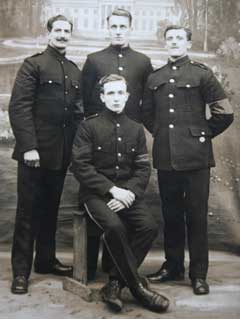
Prisoners of War, left to right, Lance Corporal Joseph Brown, number
6228, Sergeant John Bamford, number 8503, and Lance Corporal William
Charles Bloxham, number 10225, seated Corporal Jabez Pendlebury, number
10815. All of the 1st Battalion King's Own Royal Lancaster Regiment who
arrived in France on 23rd August 1914 and were taken prisoner shortly
afterwards.
Accession Number KO2490/345
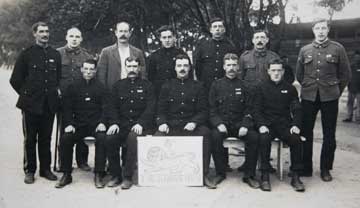
Group of King's Own Prisoners of War. This postcard was sent by Private
Nicholas Goulding, number 5906, of the 1st Battalion, King's Own Royal
Lancaster Regiment, who was taken prisoner a few days after he arrived
in France on 23rd August 1914.
Accession Number KO2490/347
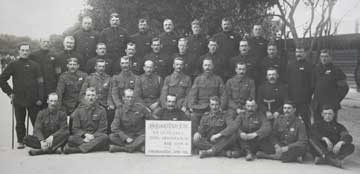
Group of Prisoners of War. The sign reads: "Campaigners, 65 South Africa
Medals, Total Service 676 Years, Total Age 1354 Years, Friedrichsfeld,
June 1916".
Accession Number KO2490/346
Whilst many prisoners of war were not released until November 1918,
those who were badly wounded and unable to serve again were sent home
via Holland or Switzerland. Those who were slightly wounded and could
possibly serve were interned in Switzerland, so whilst no longer held in
a German camp, they were not at home.
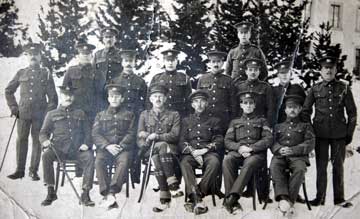
Soldiers of the King’s Own Royal Lancaster Regiment at Mürren,
Switzerland, 1916.
Accession Number: KO2725/02
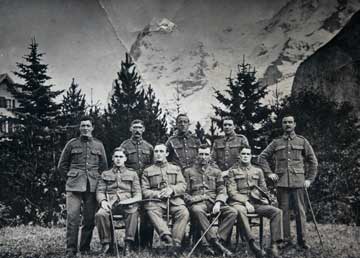
Soldiers of the King’s Own Royal Lancaster at Mürren, Switzerland. The
Eiger is in the background.
Accession Number: KO0481/02
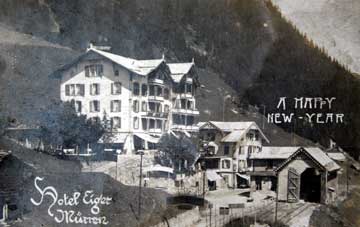
Happy New Year card, January 1917, showing the Hotel Eiger, Mürren,
Switzerland, where internees were accommodated.
Accession Number: KO2725/05
© Images are copyright, Trustees of the King's Own Royal Regiment Museum.
You must seek permission prior to
publication of any of our images.
Only a proportion of our collections
are on display at anyone time. Certain items are on loan for display
in other institutions. An appointment is required to consult any of
our collections which are held in store.







